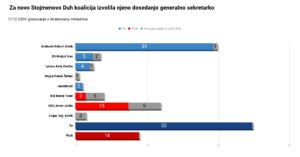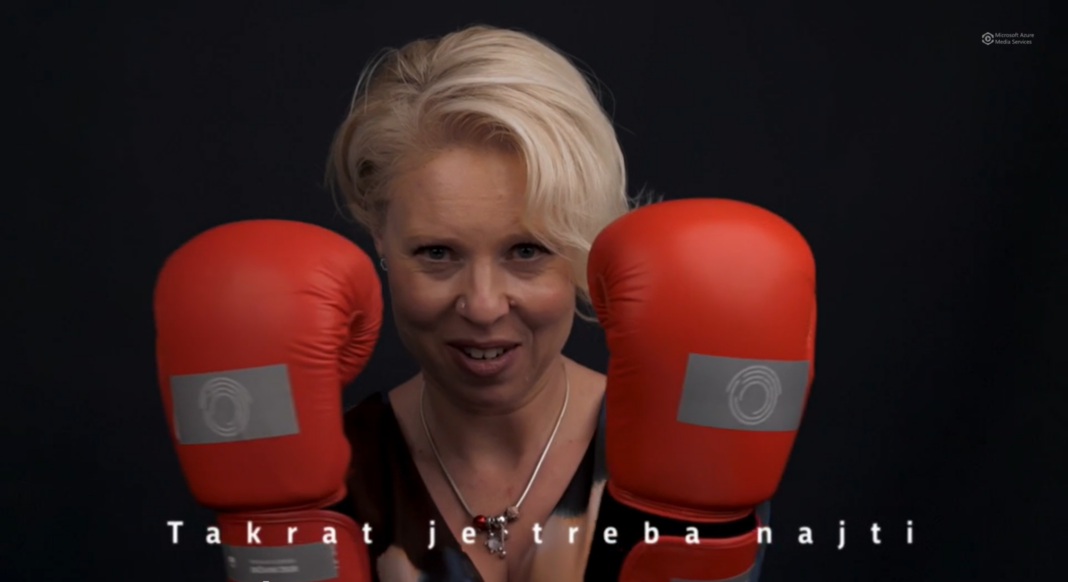By: Peter Jančič (Spletni časopis)
MPs from Svoboda, SD, and Levica elected Ksenija Klampfer, who until now served as the General Secretary (Director) of the Ministry for Digital Transformation, as the new minister following the resignation of Emilija Stojmenova Duh. Klampfer received 50 votes in favour. Stojmenova Duh made history with the “digitalisation” of a warehouse in Logatec, where over ten thousand laptops intended for the underprivileged were stored, left waiting for their warranties to expire.
Already before the vote, Urška Klakočar Zupančič had miraculously recovered. Earlier, when MPs debated a motion by SDS and NSi to dismiss her, she claimed illness as the reason she could not attend the session to listen to or respond to criticisms. However, in the evening, she appeared entirely healthy, resuming her role as Speaker of the Parliament during the session on the appointment of the new minister, showing no signs of illness.
The result of the vote on Ksenija Klampfer, who made history with her controversial ban on Croatian singer Thompson’s concert (later ruled illegal by the courts), was as follows:

Urška Klakočar Zupančič herself was also saved from dismissal by exactly 50 votes. SDS and NSi had called for her removal due to repeated intentional breaches of parliamentary rules, which they alleged she used to benefit the ruling parties’ propaganda efforts. These violations included pushing through recognition of Palestine before the EU elections and handling privileged pensions for artists. Earlier, for instance, she allegedly tried to cover up illegal actions by her MPs during the purge at RTVS. Thirty-three opposition MPs voted for her removal. Since the vote was secret, a breakdown by party cannot be provided.
During the debate on her dismissal, Klakočar Zupančič was largely absent. She only appeared at the beginning of the session. When opposition MPs questioned her absence and inability to respond, the acting Speaker, Nataša Sukič (Levica), explained: “The Speaker is unwell and is present today only due to this interpellation. I replaced her at the leadership meeting because she was ill. Please, be cautious before making statements.” The ruling coalition did not propose rescheduling the session to a time when Klakočar Zupančič might have been able to respond.
Later, Meira Hot (SD), who chaired the session, reiterated: “Since she is not here and cannot respond, I kindly ask that we limit ourselves to the proposal at hand without personal value judgments, as she is unable to defend herself due to illness.”
However, SDS parliamentary group leader Jelka Godec countered: “The Speaker is not ill. Fifteen minutes ago, she was walking in the hallway, hugging a fellow MP. If she is sick and hugging people, we will all be ill tomorrow – or at least those who hugged her. I propose you suspend the session and call the Speaker to the chamber to answer our, as one colleague says, lies.” Meira Hot dismissed this suggestion, saying: “I will not follow this procedural proposal.” Defending Klakočar Zupančič, Lena Grgurovič (Svoboda) remarked: “I apologise because I am also unwell. I took throat tablets and was on sick leave for three days. I came here for you, and I was able to hug the Speaker.”
Žan Mahnič later commented on the unusual illness: “If the Speaker were truly ill, she would have taken sick leave and gone home. She could have requested to postpone the discussion to another day, but of course, she did not. If you do not want to confront something, just walk away – that is something we have seen with her many times before.”
MPs unable to attend Parliament due to obligations or illness must notify the Assembly. Klakočar Zupančič did not report her absence.

